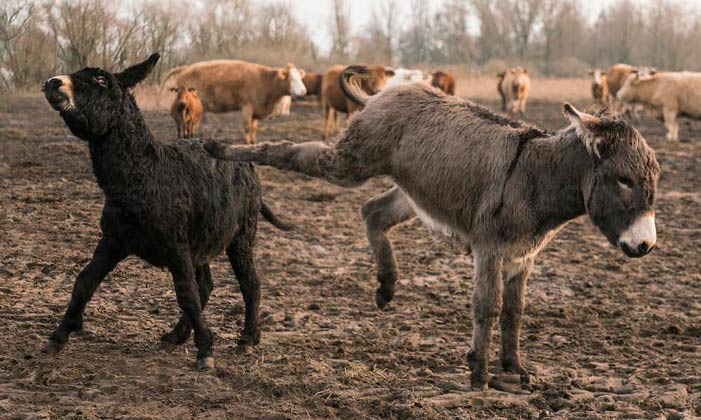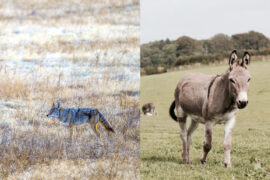Donkeys are famous for kicking. There’s even an exercise inspired by and named after donkeys kicking. But why do donkeys kick? They are such cute animals, yet they seem almost ferocious when they kick so powerfully. Donkeys are adorable but fierce.
There are several reasons why donkeys kick, but it all boils down to self-defense, protection of offspring, defense of territories, and establishing dominance. Kicking can also be in response to pain and even be because of boredom.
Kicking donkeys: why do donkeys kick?
If you see a donkey kicking out its back legs, chances are it has a very good reason for doing so. A male donkey might kick an opponent to protect his territory or protect the herd from predators. A female donkey might kick to protect herself or her baby from predators. Or the donkey could be in pain, in a bad mood, or just plain bored.

Male donkeys and territory
In the wild, a male donkey, otherwise known as a stallion or a jack, would need to find a female donkey, a jenny, to start a family. A jack would always have better luck with the jennies if he possessed a territory rich in vegetation and water. The jennies would gravitate towards the males who established dominance over a territory where they wouldn’t go hungry or thirsty.
In this scenario, if another male donkey that wasn’t part of that jack’s herd came into that territory, that jack would fight for his territorial dominance. His method of fighting would be kicking out his hind legs at his opponent and even biting him with his teeth.
Even when not in the wild, this kind of territorial behavior can still be prevalent for jacks, so it is not unheard of for a jack to behave territorially towards another donkey or even towards another species entirely. Therefore, it is usually recommended to geld or castrate your donkey unless you specifically plan on breeding your donkey.
Male donkeys; protecting the herd
Donkeys are naturally herd animals who like to stick together. In the wild, a donkey’s herd consists of a jack, that is the leader. It is highly unlikely that another donkey will try to overthrow him. It is usually peaceful within a donkey herd unless another jack from outside the pack tries to take on the leader or another herd member tries to overthrow the leader. Though unlikely in both cases, the leader would fight the stranger and put down any rebellion.
Now that the herd has been established, they will all protect each other. Donkeys don’t usually run away from a threat. Instead, when faced with danger, they stay and fight. They will use their powerful legs to kick and protect themselves.
Geldings
The same remains true for geldings or castrated donkeys. Though they may not be in the wild anymore, these same instincts remain. Though he most likely won’t be kicking for territorial reasons, the gelding will kick with his strong hind legs to defend himself and his herd from predators.
Jennies
Jennies, or female donkeys, really don’t have much to fight about. You’ll usually only see her ready to fight if she is protecting her baby from other donkeys or protecting herself (and possibly a baby) from a predator.
Kicking seems to be the last resort for a jenny. Depending on the situation, she might show other signs of uneasiness or anger first. She might flatten her ears against her head or maybe twitch them. She might repeatedly paw at the ground or even swish her tail back and forth. If she does this in your presence, it likely means that she is currently seeing you as a threat or is irritated with you somehow. It might be best to step away and give her some time to cool down before she escalates to kicking.
Why else do donkeys kick?
Donkeys can also kick for a few other reasons. They might kick because they are feeling cooped up and bored. They might be scared of a brave bird that landed on their back. Or they might kick out because they are in pain. If your donkey starts suddenly acting out like this when it hasn’t been known for this before, it might be best to get it checked out thoroughly as it could be a sign that they are in pain.
For example, arthritis, a back injury, and hip pain could all be reasons that cause your donkey to kick out. An injury to the foot or feet could also be a reason. If you lift the foot and it causes the donkey more pain, the donkey might kick out to get you to release him so he can put his foot back down. It is best to get your donkey checked thoroughly by a vet if you notice any new behaviors like this.
How to avoid getting kicked?
The most important thing to know is that you should never approach a donkey from anywhere around its hindquarters. Donkeys don’t only kick backward, but they can also kick out to the side. It is always best to approach the donkey from the front, so it is aware of your presence.
If you need to be near his backside, make sure you speak to the donkey, touch him reassuringly throughout the process, and consistently let him know of your presence. Keep close to the donkey as well. The closer you are, the less power his kicks will have.
If you notice your donkey lifting its hind leg or acting like it might kick during this process, quickly move back up to its shoulder and face area. Reassure your donkey and stroke its neck and shoulders to help calm it down again.
How to get your donkey to stop kicking?
Never discipline your donkey for kicking, no matter how frustrated you may be. A donkey can’t see behind himself, so chances are your donkey is just trying to protect its most vulnerable area. Instead, use positive reinforcement to train your donkey to stop kicking.
If he’s kicking because he’s reacting to you or other animals behind him, try desensitizing him to your touch. Start at the front and work your way back. Touch his shoulder and reward him with a treat, then his back, then lower down his back, and so on. Keep using positive reinforcement like praise and treats, and eventually, your donkey will become desensitized and not so protective over anything behind him.
Conclusion
There are several reasons donkeys kick, including boredom, fear, pain, or any number of reasons. But primarily, donkeys kick to protect themselves and establish dominance. Their ability to kick is thanks in part to the fight or flight response. They seem almost always to choose to fight. If they feel threatened, rather than fleeing and trying to run away from the threat, the donkey will more than likely stay using its powerful hind legs to kick and protect itself.

![Why Do Donkeys Kick? [And How to Avoid Getting Kicked] Why Do Donkeys Kick](https://donkeyonfarm.com/wp-content/uploads/2022/06/Why-Do-Donkeys-Kick.jpg)

![Do Donkeys Laugh? [Plus Why Do They Do It?] do-donkeys-laugh](https://donkeyonfarm.com/wp-content/uploads/2022/08/Why-do-donkeys-laugh-270x180.jpg)

![Do Donkeys Make Good Pets? [Plus What to Know Before You Get One] Do-Donkeys-Make-Good-Pets](https://donkeyonfarm.com/wp-content/uploads/2022/05/Do-Donkeys-Make-Good-Pets-270x180.jpg)
![Are Donkeys Dangerous to Dogs? [Plus How to Keep Your Dog Safe] Are-Donkeys-Dangerous-to-Dogs](https://donkeyonfarm.com/wp-content/uploads/2022/07/Are-Donkeys-Dangerous-to-Dogs-270x180.jpg)